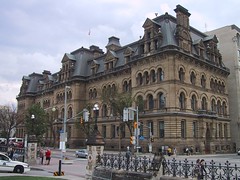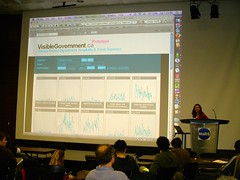Jack Straw has decided not to appeal a decision and instead the Cabinet has voted, using the power allowed it by law the law, to prevent the release of documents, for the first time since the FOI Act was passed. Y'know what? I disagree with Justin, Jennieand most Lib Dems on this. He's right to do so. We can, and should, be attacking this, but not because Cabinet minutes aren't going to be released. Cabinet minutes should not be released, it's one of the basic principles of our Parliamentary democracy. Here's how it's supposed to work:
- The House of Commons is elected as a representative cross section of British interests and opinions
- A Cabinet is formed representing the views of enough members of the House to command a majority
- Appointments are made based on support within the house and talent
- The Cabinet discusses all major aspects of policy and agrees major decisions
- The Cabinet is bound by Collective Responsibility and do not disagree in public
- Ministers that cannot agree to a decision at all should resign
- If the Cabinet no longer commands the support of the House, then the government should fall
In order for this system of government to work correctly, ministers have to be able to have free, open and frank discussions within Cabinet. If after discussion is over they come to a decision that a minister personally dislikes, the minister chooses whether this is a resigning issue or not. Robin Cook chose to resign before the Iraq War started. Clare Short was given assurances by the PM and had those assurances broken, so resigned after the war. That's the way it's supposed to work. That the Government didn't fall is not the fault of the Cabinet/Parliamentary system of government.
The problem lies not with the way this individual decision was made. The problem lies with the corrupted system that our Parliamentary democracy has become. This is the way it actually works:
- The House of Commons is elected using a gerrymandered system created in 1947 that encourages:
- an unrepresentative House with a two-party duopoly
- A predominance of white middle class men in suits
- Safe seats allocated by party fiat in which the rebellious are penalised
- Party loyalty over individual thinking
- A Cabinet is formed by the party leader, made up mostly of his/her friends or political allies
- Appointments are made based on presentational ability and sucking up
- The Prime Minister makes most major decisions and reveals them to Cabinet
- Groupthink is both likely and encouraged
- Discussion and debate is discouraged
- Ministers who disagree with the PM are aware that challenging is a threat to their career
- Super majorities from one party mean the Majority is rarely threatened
If a precedent is set for Cabinet minutes to be revealed during a period in office, then full and frank discussion within Cabinet is threatened. That it currently doesn't happen enough is part of the problem. If we are to retain the good aspects of the British system of Goverment, we need to get rid of the corruption and the parts that aren't working. Not attack the chances of the bits that sometimes do from happening.
British politics has allowed, over the last 60 years, to become increasingly corrupt and partisan. This is a fault of the electoral system, and specifically the introduction of uniform single member constituencies and the abolition of alternative voting methods made by the Representation of the Peoples Act 1948.
We need to remake and revitalise the Parliamentary system of government. For that to happen, we also need to examine how and why the Cabinet system works.
If it's decided that the Cabinet should have disagreements in public, that Collective Responsibility can be abolished, etc, then so be it. I can see arguments favouring that, especially in the new information age.
But to call for the abolishing of a fundamental feature of the British system, that has been working effectively for over 300 years, over a single, specific issue in which an abominable decision was made, is to throw out the baby with the rather murky bathwater.
Parliament voted for the Iraq war. The nation almost certainly opposed it. That is thereal problem. In defending the principles of our democracy, for once in his life, Jack Straw is right.
And if you think I liked typing that last sentence you really don't know me.
















![Reblog this post [with Zemanta]](http://img.zemanta.com/reblog_e.png?x-id=ac2d8f7a-7a13-4305-b66e-fd0eda1b87dd)





















![Reblog this post [with Zemanta]](http://img.zemanta.com/reblog_e.png?x-id=71c31259-58e9-47be-9fd1-73afc5621341)



![Reblog this post [with Zemanta]](http://img.zemanta.com/reblog_e.png?x-id=9d9d99d4-088d-4117-8cde-00ce367e0ae1)





